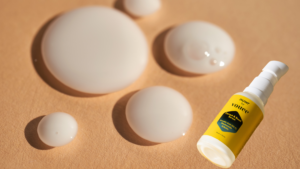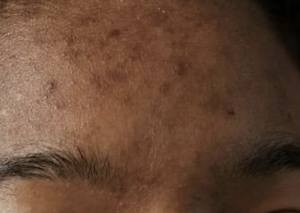The information presented on this website is not intended as specific medical advice and it is not a substitute for professional treatment or diagnosis. These statement have not been evaluated by the FDA. This product is not intended to diagnose, treat, cure or prevent any diseases.
Niacinamide and Black Skin: Your TOP 10 QUESTIONS ANSWERED

Niacinamide is everywhere—from TikTok beauty trends to clinical skincare routines—and for good reason.
It’s one of the most researched and multi-functional ingredients in skincare today.
But if you’re Black or have melanin-rich skin, you might be wondering:
- Is niacinamide actually safe for my skin?
- Will it bleach me?
- Can it help with dark marks or hyperpigmentation?
We get it. Melanin-rich skin has its own unique strengths and sensitivities. While niacinamide has become a holy grail for many, it’s important to understand how it performs specifically on darker complexions.
This article breaks down the top 10 questions Black women (and our melanin-rich sisters everywhere) are asking about niacinamide.
From how it works to how to use it in your skincare routine, we’re giving you real answers—without the fluff, and with your skin in mind.
Whether you’re trying to fade stubborn dark spots, reduce oiliness, or just level up your glow, niacinamide could be the ingredient your skin’s been waiting for….OR NOT!
Let’s get into it.
1. What is Niacinamide and how does it work?
Niacinamide, also known as vitamin B3, is a water-soluble vitamin that your skin absolutely loves.
It’s a gentle, non-irritating active that plays a huge role in maintaining a healthy skin barrier, supporting cell turnover, and balancing oil production—all things that make it a superstar for melanin-rich skin.
Unlike harsh actives that can cause irritation or sensitivity, niacinamide works with your skin, not against it. It helps reduce redness, calm inflammation, fade discoloration, and improve texture—without disrupting your skin’s natural tone.
Niacinamide is one of the best ingredients for melanin-rich skin. It targets multiple concerns without compromising the skin barrier.
It is a multi-purpose active. It’s anti-inflammatory and brightening, and barrier-strengthening tackling some of the main concerns for skin of color

2. Is niacinamide safe for Black skin?
Absolutely.
Niacinamide is not only safe for Black skin—it’s highly recommended.
Dermatologists often suggest it as a go-to ingredient for melanin-rich complexions because it tackles common concerns like dark spots, uneven tone, and inflammation without triggering irritation or bleaching.
One of the reasons it’s so well-loved is that it helps protect and strengthen the skin’s barrier, which is especially important for Black skin that can be more prone to dryness, sensitivity, and post-inflammatory hyperpigmentation (PIH).
Niacinamide also has antioxidant properties, which means it fights off free radicals from pollution, UV exposure, and stress—factors that can worsen pigmentation or dull the skin.
If your skin reacts easily to actives like retinol or vitamin C, niacinamide can be a gentler alternative—and it pairs well with most ingredients too.
3. Does niacinamide lighten Black skin?
Let’s set the record straight: niacinamide does not lighten or bleach your natural skin tone.
What it does do is help fade dark spots, hyperpigmentation, and uneven patches—especially the kind left behind by acne or inflammation (aka PIH). For melanin-rich skin, this is crucial because we’re more prone to discoloration after breakouts or irritation.
Niacinamide works by blocking the transfer of melanin from the pigment-producing cells (melanocytes) to the surface of the skin. That means instead of lightening your whole complexion, it simply prevents excess pigment from settlingwhere it’s not supposed to.
🙅🏾
Niacinamide will not bleach your skin. It helps you maintain your natural glow by supporting your skin tone—not altering it.
4. Can niacinamide help with hyperpigmentation in darker skin tones?
Yes—and that’s one of its biggest strengths.
Niacinamide is clinically proven to help reduce post-inflammatory hyperpigmentation (PIH), one of the most common concerns in melanin-rich skin.
Whether those dark marks are from acne, bug bites, eczema flare-ups, or even friction from masks (maskne, anyone?)—niacinamide works by interrupting the process that leads to uneven melanin production.
It’s especially effective when used consistently, and even more powerful when combined with ingredients like vitamin C or azelaic acid.
But unlike some of those stronger ingredients, niacinamide is less likely to irritate or cause rebound pigmentation, which is important when caring for Black skin.

💡
Niacinamide works at a cellular level to reduce melanin transfer, which is key in fading dark spots without compromising or damaging surrounding skin.
5. What % of niacinamide should I use on melanin-rich skin?
When it comes to niacinamide, more isn’t always better—especially for sensitive or melanin-rich skin.
The sweet spot for most people is 2% to 5%. These concentrations are effective enough to brighten skin, fade dark spots, and strengthen the barrier—without risking irritation. Some products go up to 10%, but if you’re new to niacinamide or have reactive skin, it’s better to start lower and work your way up.
Higher percentages can sometimes cause redness or purging, which may trigger more hyperpigmentation—the very thing you’re trying to treat.
🧴
Start with 5% or less if you’re just beginning. If your skin loves it, you can increase strength slowly—or layer with other brightening agents like vitamin C or azelaic acid.
6. Can I combine niacinamide with other actives like vitamin C or AHAs?
Yes—you absolutely can. In fact, niacinamide plays well with most active ingredients, making it one of the most versatile tools in your skincare kit.
Pairing niacinamide with:
Vitamin C can amplify brightening and antioxidant protection.
AHAs/BHAs (like glycolic or salicylic acid) can help with texture and acne, while niacinamide reduces potential irritation.
Retinol works better with niacinamide because it helps minimize the dryness and flakiness retinol can cause.
Just make sure you’re not overwhelming your skin—especially if you’re layering multiple actives.
If your skin is on the sensitive side or you’re prone to hyperpigmentation, introduce each active slowly and one at a time.
💡
Think of niacinamide as your skin’s peacekeeper—it calms and supports while more intense actives do the heavy lifting.
7. How long does it take to see results?
Like most good things in skincare, niacinamide takes time—but it works.
You can expect to see visible improvements in 4 to 8 weeks when used consistently, especially for concerns like uneven tone, dark marks, or oiliness. If you’re dealing with post-inflammatory hyperpigmentation, results may take a bit longer depending on how deep the pigmentation is.
That said, many people notice softer, smoother skin and a healthier glow within the first 2 weeks of daily use.
Consistency is key—use it once or twice daily, and don’t skip sunscreen (especially if fading dark spots is the goal).
⏱️
Track your results with weekly photos in the same lighting. You’ll notice subtle changes before anyone else does—and it’s a great motivator to stay consistent.
8. What skin types benefit most from niacinamide?
The beauty of niacinamide? It’s a true multi-tasker for all skin types, but it’s especially beneficial for those with melanin-rich skin that’s:
Acne-prone: Niacinamide helps control sebum (oil) production and reduces inflammation.
Sensitive or reactive: It calms redness, soothes irritation, and supports the skin barrier.
Dry or dehydrated: It strengthens the skin’s moisture barrier, locking in hydration.
Combination or oily: It balances oil levels without over-drying or clogging pores.
Prone to dark spots or uneven tone: Niacinamide fades hyperpigmentation while preventing new spots from forming.
It’s also a smart choice if you’re just starting out with actives—gentle but effective, and rarely causes irritation when used correctly.
🧴
If you’re not sure where to start in your skincare routine, niacinamide is a great “anchor” ingredient. It boosts results across the board and keeps your barrier protected.
9. Should I use niacinamide in the morning or at night?
Good news—you can use niacinamide both morning and night. It’s stable, non-sensitizing, and versatile enough to slot into either part of your routine.
In the morning, niacinamide:
Boosts protection against environmental stressors like pollution and UV damage.
Works well under sunscreen to help prevent dark spots and dullness.
Reduces oil and shine throughout the day.
In the evening, it:
Supports skin repair and regeneration overnight.
Enhances results from stronger actives like retinol or AHAs.
Helps fade pigmentation while calming inflammation.
If you’re using it twice a day, start with a lower concentration (around 2–5%) to avoid irritation—especially if you’re layering other actives.
🌓 Correct and Boost Serum for Darker Skin
Try pairing niacinamide with vitamin C in the AM and retinol in the PM—it’s a glow-up from every angle. Check out our Correct and Boost Serum with ethyl ascorbic acid and niacinamide
10. Can niacinamide cause purging or irritation in Black skin?
Niacinamide is generally one of the least irritating skincare actives, making it a go-to for melanin-rich skin that’s more prone to inflammation or hyperpigmentation.
Unlike retinoids or acids, niacinamide doesn’t speed up cell turnover, so it shouldn’t cause purging. If you’re experiencing breakouts after starting niacinamide, it’s more likely due to:
A formula that’s too strong (10% or higher can be irritating for some).
A reaction to another ingredient in the product (like fragrance or alcohol).
Using too many actives at once, overwhelming your skin barrier.
If irritation or breakouts happen, scale back. Use it once a day, switch to a gentler formula, or patch test before applying all over your face.
Any new product can trigger a response if your barrier is already compromised. Keep your skincare simple while introducing niacinamide to give your skin time to adjust.
✅ Key Takeaways
Niacinamide is safe and effective for Black and melanin-rich skin—it supports, protects, and brightens without bleaching your natural tone.
It helps with hyperpigmentation, dark spots, oil control, and skin barrier repair—making it ideal for common concerns in melanin-rich complexions.
Best used at 2%–5% concentration, niacinamide can be applied morning and night and layered with other actives like vitamin C, AHAs, or retinol.
Results typically show within 4 to 8 weeks with consistent use—faster when paired with daily SPF and a healthy skincare routine.
It plays well with most skin types—whether dry, oily, acne-prone, or sensitive—and is a gentle entry point for actives if you’re just getting started.
✅ Empower Your Routine
At VOUEE, we believe your skin deserves products that understand your melanin—not work against it.
That’s why our formulas are designed to nourish, brighten, and protect without compromising your natural beauty.
We believe we’ve have made the best niacinamide serum for darker skin. We have combined it with helots stable form of vitamin C. Check it out.
🛍️ Explore our niacinamide-infused essentials
🔗 [Shop the Collection]
📚 Want more expert skincare tips for melanin-rich skin?
🔗 [Read More on the Blog]
Celebrate your skin. Feed it with what it needs. Glow on your terms.
